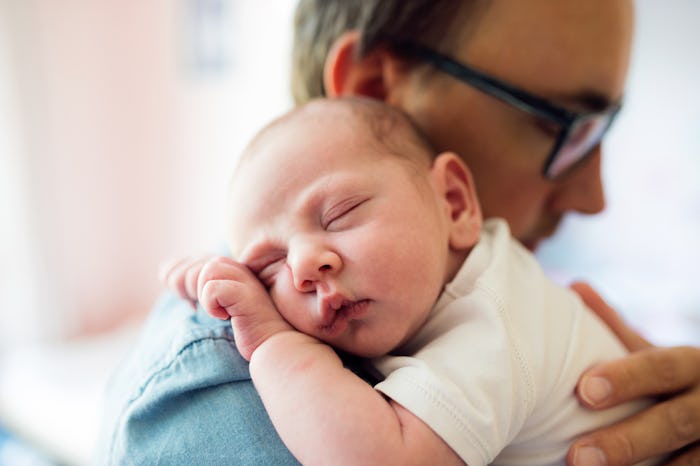Postpartum depression does not discriminate, which is why all types of moms suffer the oftentimes debilitating symptoms after welcoming a child into their lives. But even though the (totally treatable) condition is so widespread, most people — even parents — don't realize that dads can suffer from postpartum depression, too. The reality is that the major life change of welcoming a newborn into the world can have very real biological and emotional effects on both moms and dads. And it's imperative that medical professionals, family members, society in general, and especially the dads themselves accept this as a legitimate outcome so that postpartum depression doesn't unnecessarily derail anyone's transition into parenthood.
Luckily, a new study lends much-needed credence to the idea that postpartum depression isn't just for moms. Oft-cited statistics such as those from the advocacy group Postpartum Progress, which estimates that 15 percent of new moms suffer from postpartum depression, may give the impression that this is the case. The study, published in the September issue of the journal Hormones and Behavior, tells a much different story, and a more honest one.
By following 149 couple with new babies, the researchers found that the dads whose testosterone levels decreased significantly post-baby were more likely to show signs of postpartum depression. This indicates a clear biological reaction to having a baby that can bring on depression.
For new parents, such symptoms can include excessive crying, struggling to bond with the baby, intense irritability or anger, severe anxiety or panic attacks, and even thinking of hurting the baby, according to the Centers for Disease Control and Prevention.
Still, fathers who are experiencing such symptoms and feel that it could mean that postpartum depression has struck should know that they are far from alone. And, really, these feelings are natural. In fact, What To Expect reported that a drop in testosterone levels after becoming a dad is typical; it's when the testosterone hits lower-than-average levels that the problems could start.
To come to the conclusions they did, the researchers tested the dads' saliva to gauge their testosterone levels when their babies were 9 months old. They also had conversations with both parents about their possible depressive symptoms at two, nine, and 15 months postpartum. Strikingly, the female partners of the dads with the lower testosterone levels, which indicated postpartum depression, were less likely to show depressive symptoms themselves.
Speaking with U.S. News & World Report, lead study author and assistant professor of psychology at the University of Southern California Darby Saxbe hypothesized that this could be because these moms get more support from their partners.
No matter the reasons dads may suffer from postpartum depression, it's always notable when those who do talk about it in public. Adam Busby, the father of six — including toddler quintuplets— and one of the stars of the TLC reality series OutDaughtered, recently did just that.
"When I'm having bad days, I just get super quiet," he told another dad with a similar experience on the show, according to People. And, as People reported, he also shared some of his hangups about possibly seeking professional help to deal with that he's going through, proof of how important it is that dads talk about this with one another in order to reduce stigma:
I've always felt like people who have to go see a therapist can't control things, can't do things on their own. A big part of this is I'm still kind of scared. I just don’t know if that's for me.
It's true that every dad's experience with postpartum depression is likely to vary, possibly significantly, from the next, but the uniting thread is that the issue is real — and that it's nothing to be ashamed of.
Watch Romper's new video series, Romper's Doula Diaries:
Check out the entire Romper's Doula Diaries series and other videos on Facebook and the Bustle app across Apple TV, Roku, and Amazon Fire TV.
